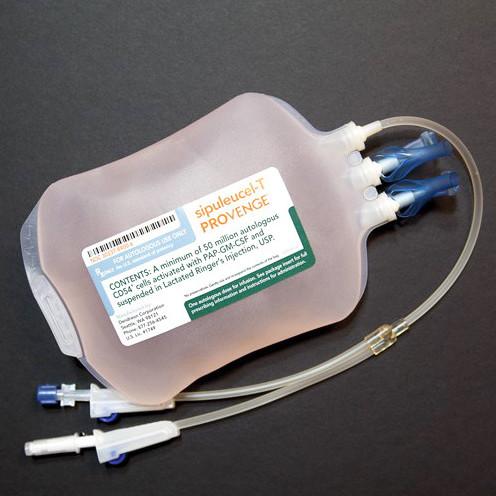Provenge Side Effects
Generic name: sipuleucel-T
Medically reviewed by Drugs.com. Last updated on Jan 8, 2025.
Note: This document provides detailed information about Provenge Side Effects associated with sipuleucel-T. Some dosage forms listed on this page may not apply specifically to the brand name Provenge.
Applies to sipuleucel-T: intravenous suspension.
Precautions
It is very important that your doctor check your progress at regular visits. Your doctor will do blood tests to make sure that sipuleucel-T (the active ingredient contained in Provenge) is working properly and to check for unwanted effects.
This medicine may cause fever; chills; dizziness; fast heartbeat; joint pain; nausea and vomiting; shortness of breath; troubled breathing; or unusual tiredness or weakness within a few hours after you receive it. Check with your doctor or nurse right away if you have any of these symptoms.
Call your doctor right away if you start to have a cough, weight loss, fever, or redness or pain at the infusion or collection sites. These may be signs that you have an infection.
Check with your doctor right away if you have chest pain or discomfort, dizziness, fainting, pounding or rapid pulse, or fast, slow, or uneven heartbeat. These maybe symptoms of a heart rhythm problem.
Do not take other medicines unless they have been discussed with your doctor. This includes prescription or nonprescription (over-the-counter [OTC]) medicines and herbal or vitamin supplements.
Serious side effects of Provenge
Along with its needed effects, sipuleucel-T may cause some unwanted effects. Although not all of these side effects may occur, if they do occur they may need medical attention.
Check with your doctor or nurse immediately if any of the following side effects occur while taking sipuleucel-T:
More common side effects
- bladder pain
- bloating or swelling of the face, arms, hands, lower legs, or feet
- bloody or cloudy urine
- body aches or pain
- chest pain
- chills
- confusion
- cough
- diarrhea
- difficult, burning, or painful urination
- difficulty with breathing
- difficulty with speaking
- double vision
- ear congestion
- fever
- frequent urge to urinate
- general feeling of discomfort or illness
- headache
- inability to move the arms, legs, or facial muscles
- inability to speak
- joint pain
- loss of appetite
- loss of voice
- lower back or side pain
- muscle aches and pains
- nasal congestion
- nausea
- pale skin
- rapid weight gain
- runny nose
- shivering
- shortness of breath
- slow speech
- sneezing
- sore throat
- sweating
- tightness in the chest
- tingling of the hands or feet
- trouble sleeping
- troubled breathing with exertion
- unusual bleeding or bruising
- unusual tiredness or weakness
- unusual weight gain or loss
- vomiting
- wheezing
Other side effects of Provenge
Some side effects of sipuleucel-T may occur that usually do not need medical attention. These side effects may go away during treatment as your body adjusts to the medicine. Also, your health care professional may be able to tell you about ways to prevent or reduce some of these side effects.
Check with your health care professional if any of the following side effects continue or are bothersome or if you have any questions about them:
More common side effects
- back pain
- burning, crawling, itching, numbness, prickling, "pins and needles", or tingling feelings
- decreased weight
- dizziness
- feeling of warmth
- lack or loss of strength
- loss of appetite
- muscle ache
- muscle or bone pain
- muscle spasms
- neck pain
- rash
- redness of the face, neck, arms, and occasionally, upper chest
- sleeplessness
- sudden sweating
- unable to sleep
- weight loss
Less common side effects
- shakiness in the legs, arms, hands, or feet
- trembling or shaking of the hands or feet
See also:
For healthcare professionals
Applies to sipuleucel-T: intravenous suspension.
Other adverse events
- Very common (10% or more): Acute infusion reactions (71.2%), chills (53.1%), fatigue (41.1%), fever (31.3%)
- Common (1% to 10%): Influenza-like illness, peripheral edema, hot flush
Cardiovascular
- Common (1% to 10%): Hypertension
- Uncommon (0.1% to 1%): Myocardial infarction
- Postmarketing reports: Hypotension, thromboembolic events (deep vein thrombosis and pulmonary embolism)[Ref]
Musculoskeletal
- Very common (10% or more): Back pain (29.6%), joint ache (19.6%), extremity pain (12.1%)
- Common (1% to 10%): Musculoskeletal pain, muscle spasms, bone pain, musculoskeletal chest pain, neck pain[Ref]
Gastrointestinal
- Very common (10% or more): Nausea (21.5%), vomiting (13.3%), constipation (12.3%), oral paresthesia (12.3%), diarrhea (10%)[Ref]
Nervous system
- Very common (10% or more): Headache (18.1%), paresthesia (14.1%), dizziness (11.8%), muscle ache (11.8%), asthenia (10.8%)
- Common (1% to 10%): Insomnia, tremor, cerebrovascular events (hemorrhagic and ischemic strokes)
- Postmarketing reports: Transient ischemic attack, syncope[Ref]
Metabolic
- Very common (10% or more): Citrate toxicity (14.8%)
- Common (1% to 10%): Anorexia, decreased weight
Hematologic
Respiratory
- Common (1% to 10%): Dyspnea, upper respiratory tract infection, cough[Ref]
Genitourinary
- Common (1% to 10%): Urinary tract infection[Ref]
Dermatologic
- Common (1% to 10%): Rash, sweating[Ref]
References
1. (2022) "Product Information. Provenge (sipuleucel-T)." Dendreon Corporation
More about Provenge (sipuleucel-T)
- Check interactions
- Compare alternatives
- Pricing & coupons
- Reviews (6)
- Drug images
- Dosage information
- During pregnancy
- FDA approval history
- Drug class: therapeutic vaccines
- En español
Patient resources
Professional resources
Related treatment guides
Further information
Provenge side effects can vary depending on the individual. Always consult your healthcare provider to ensure the information displayed on this page applies to your personal circumstances.
Note: Medication side effects may be underreported. If you are experiencing side effects that are not listed, submit a report to the FDA by following this guide.

